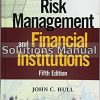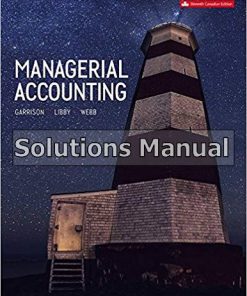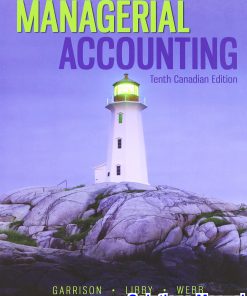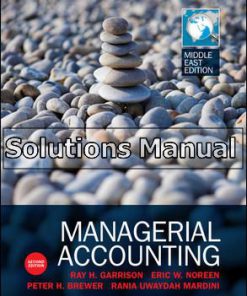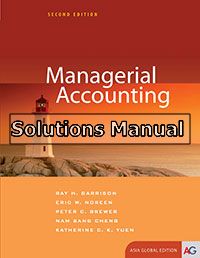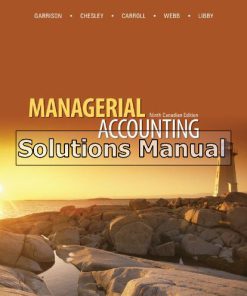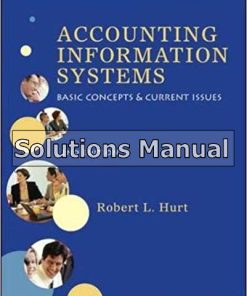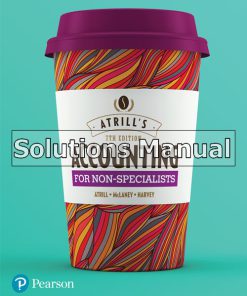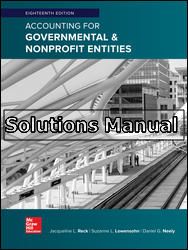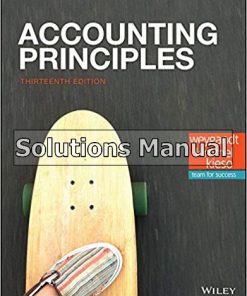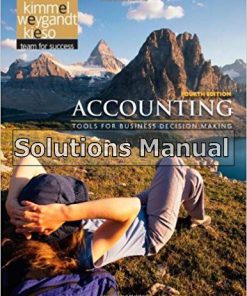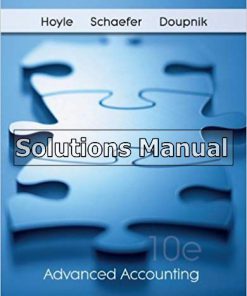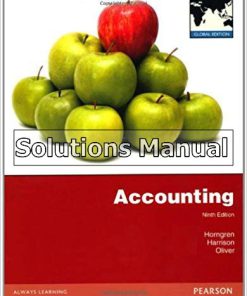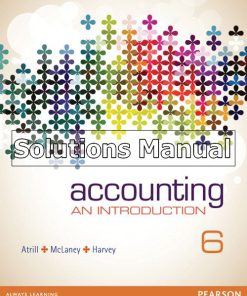Managerial Accounting 14th Edition Garrison Solutions Manual
$50.00 Original price was: $50.00.$26.50Current price is: $26.50.
Managerial Accounting 14th Edition Garrison Solutions Manual.
Managerial Accounting 14th Edition Garrison Solutions Manual
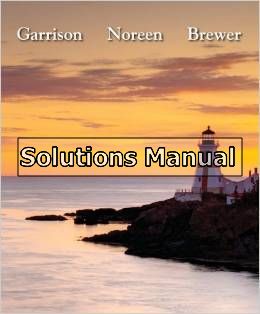
Product details:
- ISBN-10 : 0078111005
- ISBN-13 : 978-0078111006
- Author: Ray H. Garrison
As the long-time #1 best-seller, Garrison has helped guide close to 3 million students through managerial accounting since it was first published. It identifies the three functions managers must perform within their organizationsplan operations, control activities, and make decisionsand explains what accounting information is necessary for these functions, how to collect it, and how to interpret it. Garrisons Managerial Accounting is known for its relevance, accuracy, and clarity. It is also unique in that the authors write the most important supplements that accompany the book: solutions manual, test bank, instructors manual, and study guide making them both of high quality and extremely consistent with the textbook.
Table contents:
Part I Fundamentals and Cost Accumulation Systems 1 The Changing Role of Managerial Accounting in a Dynamic Business Environment 2 Managerial Accounting: A Business Partnership with Management 4 Managing Resources, Activities, and People 4 Decision Making 5 Planning 5 Directing Operational Activities 5 Controlling 6 How Managerial Accounting Adds Value to the Organization 6 Objectives of Managerial Accounting Activity 6 The Balanced Scorecard 8 M.A.P. The Balanced Scorecard 9 Managerial versus Financial Accounting 10 Managerial Accounting in Different Types of Organizations 11 Where Are Managerial Accountants Located in an Organization? 12 Organization Chart 12 Line and Staff Positions 12 Cross-Functional Deployment 13 Physical Location 14 Major Themes in Managerial Accounting 16 Information and Incentives 16 Behavioral Issues 17 Costs and Benefits 17 Evolution and Adaptation in Managerial Accounting 17 e-Business 17 Service versus Manufacturing Firms 18 Emergence of New Industries 18 Global Competition 18 Focus on the Customer 19 Cross-Functional Teams 19 Computer-Integrated Manufacturing 20 Product Life Cycles and Diversity 20 Time-Based Competition 20 M.A.P. The Internet as a Lifeline 21 Information and Communication Technology 21 Just-in-Time Inventory Management 22 Total Quality Management 23 Continuous Improvement 23 Cost Management Systems 23 Strategic Cost Management and the Value Chain 24 Theory of Constraints 25 The Ethical Climate of Business and the Role of the Accountant 25 Managerial Accounting as a Career 26 Professional Organizations 27 Professional Certification 27 Professional Ethics 27 Focus on Ethics: Standards of Ethical Conduct for Practitioners of Managerial Accounting and Financial Management 27 Chapter Summary 28 Key Terms 29 Review Questions 29 Exercises 30 Problems 30 Cases 32 Current Issues in Managerial Accounting 33 2 Basic Cost Management Concepts and Accounting for Mass Customization Operations 34 What Do We Mean by a Cost? 36 Product Costs, Period Costs, and Expenses 36 Costs on Financial Statements 38 Income Statement 38 Balance Sheet 40 Manufacturing Operations and Manufacturing Costs 41 M.A.P. Mass Customization 42 Mass-Customization Manufacturing 42 Manufacturing Costs 43 Manufacturing Cost Flows 45 Production Costs in Service Industry Firms and Nonprofit Organizations 47 Basic Cost Management Concepts: Different Costs for Different Purposes 48 The Cost Driver Team 48 Variable and Fixed Costs 49 The Cost Management and Control Team 50 M.A.P. Airline Industry: Cost Structure, Cost Drivers, and a Shifting Business Model 52 The Outsourcing Action Team 54 Costs and Benefits of Information 57 Focus on Ethics:Was WorldCom?s Controller Just Following Orders? 57 Chapter Summary 58 Review Problems on Cost Classifications 59 Key Terms 60 Review Questions 60 Exercises 61 Problems 64 Cases 73 Current Issues in Managerial Accounting 75 3 Product Costing and Cost Accumulation in a Batch Production Environment 76 Product and Service Costing 78 Product Costing in Nonmanufacturing Firms 78 Flow of Costs in Manufacturing Firms 79 Types of Product-Costing Systems 79 Job-Order Costing Systems 80 Process-Costing Systems 81 Summary of Alternative Product-Costing Systems 81 Accumulating Costs in a Job-Order Costing System 81 Job-Cost Record 82 Direct-Material Costs 82 Direct-Labor Costs 84 Manufacturing-Overhead Costs 84 M.A.P. Supply Chain Management 85 Summary of Event Sequence in Job-Order Costing 86 Illustration of Job-Order Costing 88 Purchase of Material 88 Use of Direct Material 88 Use of Indirect Material 88 Use of Direct Labor 89 Use of Indirect Labor 89 Incurrence of Manufacturing-Overhead Costs 90 Application of Manufacturing Overhead 90 Summary of Overhead Accounting 91 Selling and Administrative Costs 92 Completion of a Production Job 92 Sale of Goods 92 Underapplied and Overapplied Overhead 93 Schedule of Cost of Goods Manufactured 94 Schedule of Cost of Goods Sold 95 Posting Journal Entries to the Ledger 95 Further Aspects of Overhead Application 97 Accuracy versus Timeliness of Information: A Cost-Benefit Issue 97 Choosing the Cost Driver for Overhead Application 99 Limitation of Direct Labor as a Cost Driver 99 Departmental Overhead Rates 99 M.A.P. Are Layoffs a Good Way to Cut Costs during an Economic Downturn? 100 Two-Stage Cost Allocation 100 Project Costing: Job-Order Costing in Nonmanufacturing Organizations 102 Changing Technology in Manufacturing Operations 103 Electronic Data Interchange 103 M.A.P. Online Purchasing 103 Use of Bar Codes 104 Focus on Ethics: Did Boeing Exploit Accounting Rules to Conceal Cost Overruns and Production Snafus? 104 Chapter Summary 105 Key Terms 106 Appendix to Chapter 3: Activity-Based Costing: An Introduction 106 Review Questions 109 Exercises 110 Problems 115 Cases 127 Current Issues in Managerial Accounting 129 4 Process Costing and Hybrid Product- Costing Systems 130 Comparison of Job-Order Costing and Process Costing 132 Flow of Costs 132 Differences between Job-Order and Process Costing 134 Equivalent Units: A Key Concept 134 Equivalent Units 135 Illustration of Process Costing 136 Basic Data for Illustration 136 M.A.P. Process-Costing Steps in Paper Manufacturing 138 Weighted-Average Method of Process Costing 138 Other Issues in Process Costing 142 Actual versus Normal Costing 142 Other Cost Drivers for Overhead Application 143 Subsequent Production Departments 143 Hybrid Product-Costing Systems 143 Operation Costing for Batch Manufacturing Processes 144 Chapter Summary 147 Key Terms 148 Appendix to Chapter 4: Process Costing in Sequential Production Departments 148 Review Questions 151 Exercises 152 Problems 155 Cases 163 Current Issues in Managerial Accounting 165 Part II Cost Management Systems, Activity-Based Costing, and Activity-Based Management 5 Activity-Based Costing and Cost Management Systems 166 Aerotech Corporation: A Tale of Two Cities 168 Aerotech?s Phoenix Plant: Traditional Production Process 168 Production Process 168 Plant Layout 169 Traditional, Volume-Based Product-Costing System 169 Trouble in Phoenix 171 Activity-Based Costing System 172 Interpreting the ABC Product Costs 177 The Punch Line 179 Why Traditional, Volume-Based Systems Distort Product Costs 179 M.A.P. Cost Distortion at Rockwell International 182 Activity-Based Costing: Some Key Issues 182 Cost Drivers 182 Homogeneous Activity Cost Pools 184 M.A.P. Activity Cost Drivers in the Health Care Industry 184 Collecting ABC Data 185 Activity Dictionary and Bill of Activities 186 Direct versus Indirect Costs 186 When Is a New Product-Costing System Needed? 187 Cost Management Systems 188 Non-Value-Added Costs 189 Identifying Non-Value-Added Costs in the Phoenix Plant 190 Activity-Based Costing in the Service Industry 191 M.A.P. Activity-Based Costing in the Service Industry 192 Focus on Ethics: Ethical Issues Surrounding Activity-Based Costing 193 Chapter Summary 194 Review Problems on Cost Drivers and Product-Cost Distortion 194 Key Terms 195 Review Questions 195 Exercises 196 Problems 200
People also search:
managerial accounting 14th edition
financial and managerial accounting 14th edition
solutions managerial accounting 14th edition
financial and managerial accounting 14th edition access code
managerial accounting 14th edition chapter 6 solutions
Instant download after Payment is complete
You may also like…
Solutions Manual
Solutions Manual
Managerial Accounting Canadian 9th Edition Garrison Solutions Manual
Related products
Solutions Manual
Accounting Information Systems 2nd Edition Hurt Solutions Manual
Solutions Manual
Accounting For Governmental And Nonprofit Entities 18th Edition Reck Solutions Manual
Solutions Manual
Accounting Principles 13th Edition Weygandt Solutions Manual
Solutions Manual
Solutions Manual
Solutions Manual
Accounting An Introduction 6th Edition Atrill Solutions Manual



